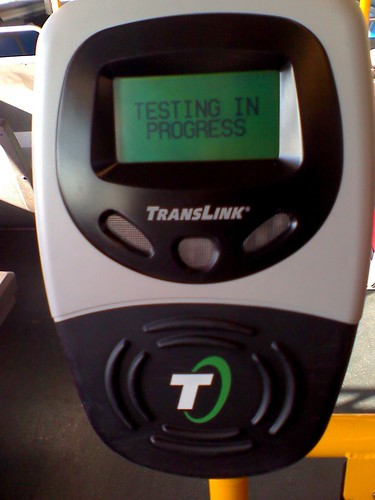
I'm scratching my head today because the Contra Costa Times released an article about BART's history of consistent delays with the Translink program.
What made me a little concerned is on one of the details: The article mentions BART was worried about their "float," the money that BART has in those remaining ticket value that people have, and sometimes just don't claim.
Examples of float: Those BART tickets with little cash value (say a dime or a nickel) or anyone who just doesn't use their BART tickets. BART can make money off the "float" in interest while still holding onto that "float" in the worst case situation that all those passengers with "float" uses up their tickets.
If Translink were to take care of the "float," then BART would lose out in the interest money made from it because the MTC would profit off it or maybe distribute it evenly to the transit agencies, thereby BART was redundant to accept Translink, and (I assume) started the EZ Rider program so they can keep their "float."
The article continues from there stating this:
"A solution was reached. When BART riders pay with a TransLink card, their fares will immediately be electronically transferred into an account designated specifically for BART, known as an "e-purse." BART is the only transit agency that will have such an account."
I know for sure that BART will have a separate e-cash balance for passengers who use those high value tickets (that 6.25% bonus when you get one of those high priced pre-paid tickets at vendors), but what makes it really concerning with Translink coming on board...
- Will passengers who have the "universal" e-cash (valid for all agencies) on their Translink card, still be able to use that electronic purse to pay for their BART rides? Or do passengers now have to take an annoying ass step by putting on money to BART's e-cash purse?
- What's the process of deducting the fare if you have funds on both e-cash purses?
Here's some research I found:
I've looked around in the Translink FAQ section for BART and it says:
"Starting early in the summer, transit riders can sign up to participate by ordering a TransLink card and adding either e-cash or setting up Autoload for BART High-Value Discount tickets."
- Now... when they mean "e-cash" in this statement, do they mean the all-agency e-cash, or the special BART e-cash purse?
--------------------
Akit's opinion:
I hope Translink and BART will allow passengers with their regular e-cash purse to ride BART if they don't want to take advantage of the high value discount tickets for BART. I'm personally not that interested in high value discount tickets, and it's frustrating enough want to mess with my commuter checks that are already being deposited into my e-cash account (the all-agency account).
And BART Board Member James Fang should go **** himself. Translink is not a "disaster;" you are for wasting $350,000 for a cell phone pilot program when BART could have used that money to improve service instead of just recently approving to cut trains and raise fares.
--------------------
BART and Translink/MTC officials, got an answer? Post it in the comments. Opinions welcomed too!
2 comments:
Even if BART makes Translink keep a separate, BART-only balance for each card, it seems like it wouldn't be hard to add a feature by which your BART-only balance is recharged from your regular balance if necessary for people who don't regularly use BART. It would still be stupid to have to put more money on the card if you have $48 in BART money but $0 in regular money though.
I hope whoever is in charge of this whole mess at BART chokes on their caviar.
In reading the FAQ closely, it seems clear that they mean e-cash as in "works on everything." The separate BART e-cash purse would be the high value discount ticket.
I'm with you -- a $3 discount isn't enough for me to buy something separate for my card. But, since I ride BART home every day, I guess those $3 would add up pretty fast.
James Fang. What a dick.
Post a Comment